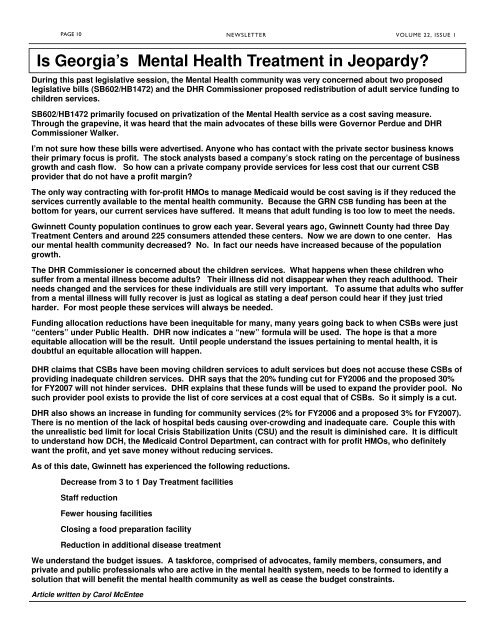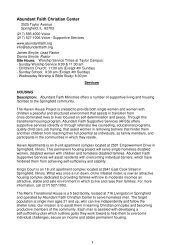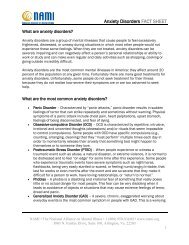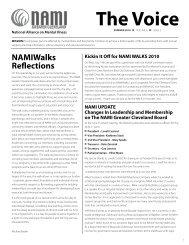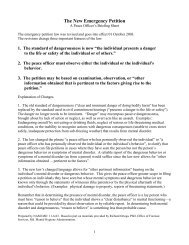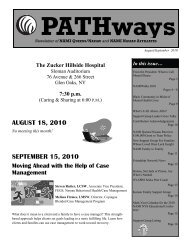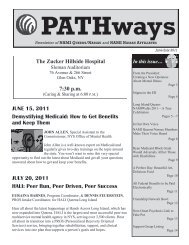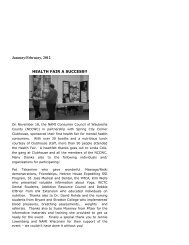Advocacy Committee Meets Congressman John Linder - NAMI
Advocacy Committee Meets Congressman John Linder - NAMI
Advocacy Committee Meets Congressman John Linder - NAMI
Create successful ePaper yourself
Turn your PDF publications into a flip-book with our unique Google optimized e-Paper software.
! "!# $%! !& '%()! $$(!<br />
Is Georgia’s Mental Health Treatment in Jeopardy?<br />
During this past legislative session, the Mental Health community was very concerned about two proposed<br />
legislative bills (SB602/HB1472) and the DHR Commissioner proposed redistribution of adult service funding to<br />
children services.<br />
SB602/HB1472 primarily focused on privatization of the Mental Health service as a cost saving measure.<br />
Through the grapevine, it was heard that the main advocates of these bills were Governor Perdue and DHR<br />
Commissioner Walker.<br />
I’m not sure how these bills were advertised. Anyone who has contact with the private sector business knows<br />
their primary focus is profit. The stock analysts based a company’s stock rating on the percentage of business<br />
growth and cash flow. So how can a private company provide services for less cost that our current CSB<br />
provider that do not have a profit margin?<br />
The only way contracting with for-profit HMOs to manage Medicaid would be cost saving is if they reduced the<br />
services currently available to the mental health community. Because the GRN CSB funding has been at the<br />
bottom for years, our current services have suffered. It means that adult funding is too low to meet the needs.<br />
Gwinnett County population continues to grow each year. Several years ago, Gwinnett County had three Day<br />
Treatment Centers and around 225 consumers attended these centers. Now we are down to one center. Has<br />
our mental health community decreased? No. In fact our needs have increased because of the population<br />
growth.<br />
The DHR Commissioner is concerned about the children services. What happens when these children who<br />
suffer from a mental illness become adults? Their illness did not disappear when they reach adulthood. Their<br />
needs changed and the services for these individuals are still very important. To assume that adults who suffer<br />
from a mental illness will fully recover is just as logical as stating a deaf person could hear if they just tried<br />
harder. For most people these services will always be needed.<br />
Funding allocation reductions have been inequitable for many, many years going back to when CSBs were just<br />
“centers” under Public Health. DHR now indicates a “new” formula will be used. The hope is that a more<br />
equitable allocation will be the result. Until people understand the issues pertaining to mental health, it is<br />
doubtful an equitable allocation will happen.<br />
DHR claims that CSBs have been moving children services to adult services but does not accuse these CSBs of<br />
providing inadequate children services. DHR says that the 20% funding cut for FY2006 and the proposed 30%<br />
for FY2007 will not hinder services. DHR explains that these funds will be used to expand the provider pool. No<br />
such provider pool exists to provide the list of core services at a cost equal that of CSBs. So it simply is a cut.<br />
DHR also shows an increase in funding for community services (2% for FY2006 and a proposed 3% for FY2007).<br />
There is no mention of the lack of hospital beds causing over-crowding and inadequate care. Couple this with<br />
the unrealistic bed limit for local Crisis Stabilization Units (CSU) and the result is diminished care. It is difficult<br />
to understand how DCH, the Medicaid Control Department, can contract with for profit HMOs, who definitely<br />
want the profit, and yet save money without reducing services.<br />
As of this date, Gwinnett has experienced the following reductions.<br />
Decrease from 3 to 1 Day Treatment facilities<br />
Staff reduction<br />
Fewer housing facilities<br />
Closing a food preparation facility<br />
Reduction in additional disease treatment<br />
We understand the budget issues. A taskforce, comprised of advocates, family members, consumers, and<br />
private and public professionals who are active in the mental health system, needs to be formed to identify a<br />
solution that will benefit the mental health community as well as cease the budget constraints.<br />
Article written by Carol McEntee


